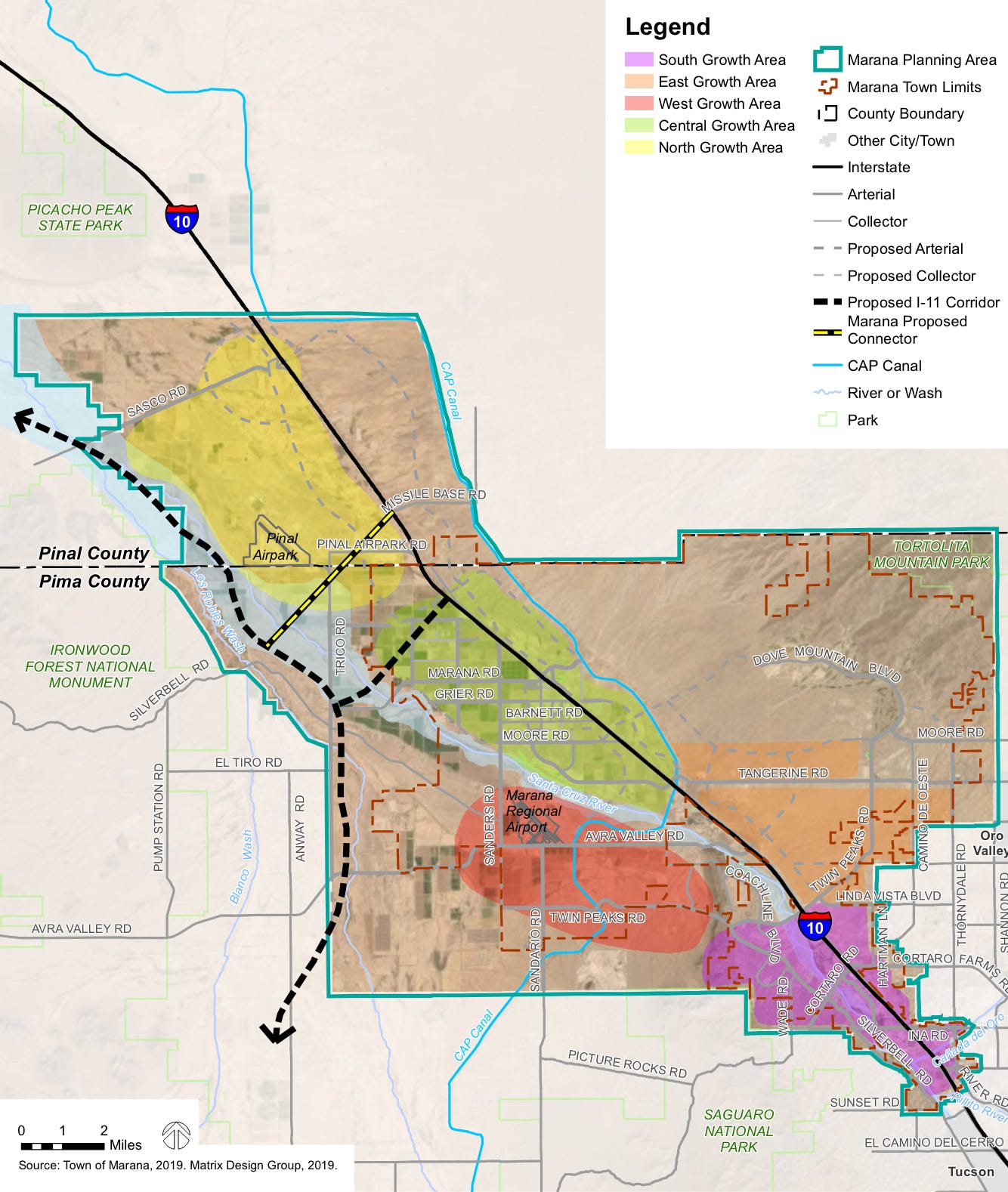The Daily Agenda: In Marana, all roads lead to roads
Marana council candidates explain what they plan to do … Roads and bridges are top of mind … TUSD is ready to roll.
The Town of Marana is going to spend $500 million on capital projects over the next few years, and a lot of that is going to transportation.
So it’s no surprise that all the candidates for town council were quick to point to roads, bridges and other transportation projects when we asked them what they planned to do if elected. Marana is growing fast and whoever wins the July 30 election will be in charge of making sure infrastructure keeps up, as well as managing police and fire departments, dealing with increased housing needs, and a long list of other issues.
Last month, we introduced you to the candidates running for mayor and two seats on the Marana Town Council. Today, you’ll hear from them about what they see as the biggest problem Marana faces, their top priorities if elected, and why they think they’re qualified to run the town.
Melissa Zupi: At 41 years old, she is the youngest candidate in the race. She says she is a proud wife and mother of four boys. Zupi has a diverse professional background, having worked in the banking industry and insurance. Right now, she is the general manager of the Marana Pumpkin Patch and Farm Festival.
She says she’s running for town council because she has deep roots in Marana, where she grew up and is now raising her children. That fuels her passion for enhancing the town as a place to live, work, play, and stay.
Why is she qualified to serve on the council? She’s never served in public office, but she says she has other qualifications.
"Managing a home of four boys undoubtedly qualifies me to serve on the Marana Town Council," Zupi said.
Also, during her tenure at the pumpkin patch, Zupi says she developed skills such as timeline management, budgeting, and maintaining strong relationships, which are crucial for a town council member. That job also helped hone her skills in ag-tourism.
For her, one of the biggest problems Marana faces is the lack of infrastructure. She highlighted safety concerns at the Marana and Tangerine I-10 exits, where vehicles often back up onto the interstate during busy hours.
If elected, her top priorities would be funding and building critical infrastructure like highway interchanges, power, water, and drainage systems to ensure a sustainable water supply.
She’d like to add an interchange at Moore Road, which she says is an affordable alternative. To fund that project, Zupi would get half of the money from ADOT. She’d also collaborate with railroad and electric companies to create a timeline for relocating their equipment, which would help move the project forward.
Zupi says she also is committed to working with local police and fire departments to ensure they have the necessary funding, equipment, and training.
"I am looking forward to using my skills, dedication, and unwavering love for our community to serve my fellow community members to the best of my abilities," says Zupi.
A Tucson Agenda reader asked us why they didn’t hear more about the fact that Zupi is the brother of Jon Post, who already is serving on the council. She says she wants to run a campaign “based on who I am as a candidate and what my views are as a member and potentially leader of this community,” instead of riding the “coattails of my brother’s success.”
Roxanne Ziegler: She is one of the veterans on the council, where she’s served for 18 years.
Prior to that, Ziegler, 70, spent 30 years working as a contract and negotiation manager. She collaborated with prominent companies such as Raytheon, Honeywell, and IBM. She studied at National University in San Diego and the University of Phoenix and also contributed to the Marana Planning Commission.
Ziegler said some of her biggest accomplishments on the council were working on the Arizona Veterans Memorial Cemetery, securing a 100-year water supply designation, and the development of the Twin Peaks and Ina Road interchange.
Ziegler says she is deeply committed to public safety. She praised the Marana Police Department for their hard work and leadership, which she said led to a drop in both property crime and violent crime over the past five years.
“The safety, security and well-being of every citizen in the Town is my first priority,” she said.
If re-elected, she plans to prioritize staying connected with residents through her Facebook group MaranaRox and the Nextdoor app.
Ziegler believes transportation is the town's most significant challenge. She highlights Marana's efforts to update a 20-year transportation plan that will evolve with the community, including the results of a recent survey of Marana residents.
She also is focused on maintaining safe and less congested roadways, such as the Tangerine Farms Road Extension and widening projects on Tangerine Road and Twin Peaks/Rattlesnake Pass Road.
Her other priorities include managing water and natural resources and protecting wildlife. She also wants to attract additional restaurants, pointing to her efforts establishing the Marana Restaurants Taskforce.
Patrick Cavanaugh: Cavanaugh, 68, says his entrepreneurial experience will serve him well on the council.
He said he has launched several successful businesses in agriculture, retail, and media, all of which taught him about leadership, budgeting, and payroll management. He is a graduate of the University of Florida.
"I am confident in my readiness to serve," Cavanaugh said.
He believes his qualifications for serving on the council stem from speaking with hundreds of community members about their concerns. He plans to bring those concerns to the council if elected.
Cavanaugh's top priority is to focus on infrastructure improvements, particularly on Cortaro, Tangerine, and Marana roads.
"Cortaro and Marana Roads are tied to I-10 and the Union Pacific Railroad, causing severe backups and inconvenience," says Cavanaugh.
He emphasizes the potential dangers of these interchanges if emergency equipment cannot pass through. If elected, he’d try to secure federal and state funds to build overpasses similar to those on Ina and Twin Peaks roads.
In 2022, Cavanaugh narrowly lost his bid for a seat on the town council, but he remains eager to bring his skills and dedication to the town and improve quality of life for residents.
Here at the Tucson Agenda, we like nothing more than covering local elections. Upgrade to a paid subscription so we can keep doing it!
Ed Honea: With 37 years of service to the town, Honea says he has a deep understanding of the community's needs.
"I've been doing this for a long time, so I know what the needs are and I'm able to make decisions," he said.
Honea, 76, is running unopposed for mayor. A graduate of the U.S. Naval School of Construction and Pima Community College, Honea has also been recognized for his volunteer work.
He pointed to infrastructure as a critical issue for Marana and the surrounding communities, particularly roads, sewer systems, and water management.
With the town's continuous growth, he highlighted the need for proactive planning.
"You don't want to build wastewater improvements after you need them; you need to build them prior," Honea said.
He has been involved in various projects, including the addition of a new community aquatic center in North Marana, and continues to work on improving parks and recreational facilities.
He emphasizes the importance of undertaking projects that will benefit the most people and looking out for the community as a whole.
Moving on: Politico reports that the University of Arizona Foundation recently ended its lobbying agreement with The Tiber Creek Group, a Washington D.C.-based “bipartisan government relations firm.” We wrote about the UA Foundation in April and its $1.4 billion in reported assets at the end of the 2022 fiscal year. That same year, it reported spending $25,000 on lobbying. Additional details about its lobbying efforts weren’t immediately available.
A nutty idea: A representative from the U.S. Department of Agriculture spoke with producers and tribal representatives in Tucson Friday morning, about a new initiative meant to make it easier to export specialty crops, Arizona Public Media’s Paola Rodriguez reports. The Assisting Specialty Crops Export Initiative breaks down non-tariff trade barriers to the export of specialty crops, like tree nuts and horticultural crops. The goal is to create new international markets while bolstering existing ones.
Ready to roll: Tucson Unified School District officials say its transportation department is ready for the start of the school year, with plenty of drivers and a pay raise on the horizon, the Arizona Daily Star’s Jessica Votipka writes. TUSD says it has 187 road-ready drivers and another eight in training, with six of the drivers in training anticipated to be on the road by the first day of school. While the goal is to have 200 drivers road-ready, district officials say that this year’s numbers are a vast improvement from the 140 drivers in the district’s workforce in the wake of the pandemic.
Lowering the bar: The Arizona Supreme Court approved a new system that will make it easier for some people to become lawyers, the Arizona Luminaria’s John Washington reports. The change includes lowering the minimum score required to be conditionally admitted to the state bar and seeks to solve Arizona’s shortage of lawyers. The state has the second lowest number of lawyers per capita in the country. Currently, a person who wants to practice law in Arizona needs to get at least 270 points to pass the bar exam. The new rule will allow people with scores between 260 and 269 to practice law under state supervision.
Voter victory: An Arizona Court of Appeals panel says that Cochise County disenfranchised some voters during a May 2023 special election, with the decision overturning the case’s previous dismissal, the Arizona Republic’s Sarah Lapidus writes. The lawsuit, which says the county disenfranchised 11,000 voters on the inactive list by failing to send them ballots, will now move forward with the remaining issue of whether the 11,000 votes were sufficient to change the election’s outcome up to the Supreme Court to decide.
Taking stock: The Green Valley News’ Dan Shearer and Cody Hedges spoke to community members and local political groups in the wake of Saturday’s assassination attempt of former President Donald Trump about topics including mental health, bullying, gun violence prevention, conspiracy theories and wild political discourse.
“This political violence stuff just gets crazy,” said Dave Smith, chairman of the Pima County GOP and a retired career police officer. “This bizarre, hysterical rhetoric had got to stop. It’s just becoming so intense.”
39,101: The number of early ballots Pima County voters returned as of Monday, according to Uplift Campaigns.











